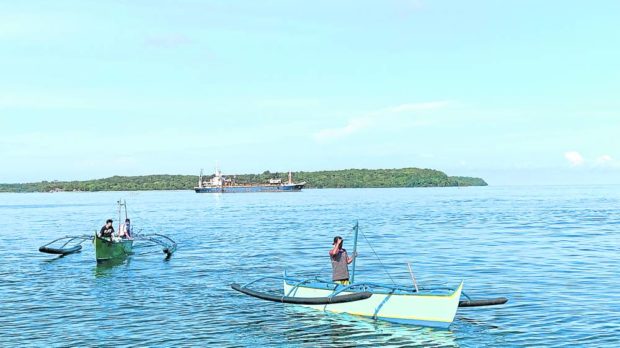
RELUCTANT Fishermen in Masinloc town of Zambales, in this photo taken on Oct. 15, prepare to sail in the municipal waters. Most of them are still reluctant to go back to Panatag (Scarborough) Shoal after experiencing harassment by the Chinese coast guard and by activities by China, including a rocket launch that left debris in their traditional fishing ground. —JOANNA AGLIBOT
SAN ANTONIO, ZAMBALES—Fishermen in this province raised concern over the possibility of floating debris at their fishing ground that reportedly fell from a Chinese rocket that was launched on Monday afternoon.
Bobby Roldan, a local fisherman and vice chair for Luzon of fisherfolk group Pamalakaya, said this debris could pose a danger to fishermen venturing out into the West Philippine Sea.
“We urge the authorities to ensure that the fishing grounds of our fishers are cleared of any possible debris caused by China’s recent rocket launch,” Roldan told the Inquirer in a text message on Tuesday.
On Monday, the Philippine Space Agency (PhilSA) said a rocket was launched from the Wenchang Space Launch Center in China’s Hainan Island at 3:37 p.m. Philippine time that day.In an advisory, PhilSA said the rocket carried the Mengtian laboratory module for the Tiangong space station, a research facility being built by China in orbit.
Traditional fishing ground
Citing the notice issued by the Civil Aviation Administration of China to the Civil Aviation Authority of the Philippines, PhilSA said the identified drop zone 1 was about 72 kilometers from Bajo de Masinloc, locally known as Panatag, or Scarborough Shoal.
The shoal is about 240 km from the coastline of Zambales and serves as the traditional fishing ground for fishermen in Luzon. It is located inside the country’s 370-km exclusive economic zone.
PhilSA said drop zone 2 was some 39 km from Busuanga town in Palawan province.
“Anticipated to fall within these areas are the ‘expected unburned debris,’ or parts of the rocket designed to be discarded as the rocket enters outer space,” PhilSA said.
It said these components got separated from the rocket minutes after the launch and were designed to float over bodies of water to minimize the hazard of falling into populated areas.
“The booster stages are expected to fall on drop zone 1, while the rocket fairing is expected to fall on drop zone 2,” PhilSA added.
Boats warned
Although PhilSA noted that the debris from Long March 5B would unlikely fall on land features or inhabited areas in the Philippine territory, falling debris would still pose a “considerable risk” to ships, aircraft, fishing boats, and other vessels that will pass through the drop zones.
“Actual drop zones may also vary because of various factors, such as the Earth’s rotation, weather and climate conditions,” it said.
It added: “There is also a possibility for the debris to float around the area and wash toward nearby coasts.”
‘Threatened’
But Roldan described the falling rocket debris as “highly alarming,” noting that debris from a Chinese rocket had previously landed in Philippine waters during an uncontrolled reentry.
He was referring to the suspected fallen rocket fairings from China’s launch of one of its rockets that were found by Filipino fishermen near Mindoro Strait on July 27.
According to Roldan, China has been failing in meeting “responsible standards” regarding space debris.
MUNICIPAL WATERS ONLY A fisherman in Masinloc, Zambales, checks on his gear on Oct. 15 as he gets ready for another day off fishing but only within the town’s municipal waters. Masinloc fishers are scared to venture to their fishing grounds in Panatag (Scarborough) Shoal after getting harassed by China’s coast guard that claims the shoal as its territory. —JOANNA AGLIBOT
He said this recent activity by China would “endanger” Filipino fishermen, “who are already threatened by the Chinese presence in the Philippine exclusive economic zone.”
In 2012, China seized control of Panatag Shoal after a tense standoff with the Philippine Navy, which led the Philippine government to file a case against China before the international arbitration court. The Philippines won in the arbitration court but the ruling was not recognized by China.
In recent years, Filipino fishermen have been reportedly harassed by patrolling Chinese coast guards in the area by driving them away using water cannons.
“We demand the Marcos administration to denounce China over this reckless act that could possibly endanger any Philippine vessel present in our territorial waters,” Roldan said. INQ